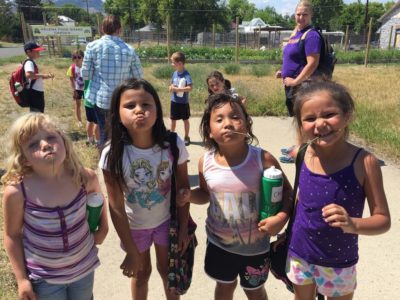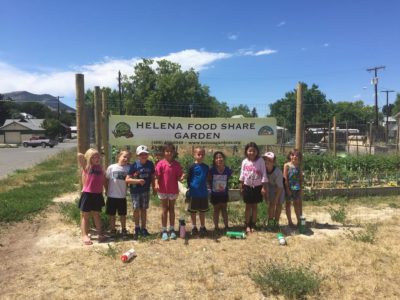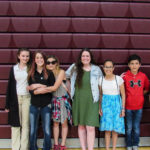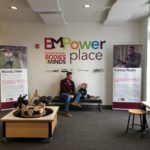ROOM TO GROW: A SERVICE STORY BY CARA GETCHES
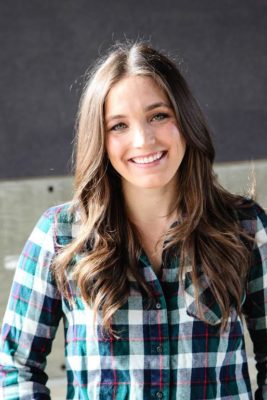 Below is a story of service from Cara Getches, one of our VISTA Summer Associates with the Helena YMCA. Cara’s experience as an AmeriCorps VISTA was full of meaning, reflection and growth on multiple levels. We appreciate the commitment she took to serve underprivileged youth and praise the impact she had in their lives and the community at large. Here is a link to a video Cara produced for the YMCA Summer Literacy Initiative. The Password to access the video is: YMCA
Below is a story of service from Cara Getches, one of our VISTA Summer Associates with the Helena YMCA. Cara’s experience as an AmeriCorps VISTA was full of meaning, reflection and growth on multiple levels. We appreciate the commitment she took to serve underprivileged youth and praise the impact she had in their lives and the community at large. Here is a link to a video Cara produced for the YMCA Summer Literacy Initiative. The Password to access the video is: YMCA
__________________________________________
Room to Grow
By Carolyn Getches
Campus Compact AmeriCorps VISTA, Summer 2016
For years, serving with AmeriCorps was on my list of things to do. Like traveling to Europe and riding in a hot air balloon, it had a certain romance to it. Sure, I loved the idea of helping my community, but I also had grand images of myself handing over the keys to a new house I built for a young family, impressed smiles from my parents’ friends at my obvious selflessness and a child who hadn’t spoken in years looking up at me and whispering, “Hello.” At the time, I was in my early twenties and it was easy to get lost in how experiences reflected on me, rather than how I could truly be of service to others.
After graduation, I combed through the AmeriCorps database, desperate to find that perfect match that would give me a clear purpose. I considered applying to a few, but when my internship turned into a salaried position, I hopped quickly on the corporate ladder. Soon, I was stuck in the seductive trap of working too many hours for just enough money, certain that the next promotion was the only fix. Improving the world outside my office was far from my mind. Finally, I saw a way out when an imminent move to Lincoln, NE was on the horizon.
AmeriCorps seemed like a good way to get involved in my new community and find a path to more fulfilling work. Again, I spent hours searching for the right match and, this time, even applied to a few positions. I got as far as exchanging several emails with my potential site supervisor, before I accepted another job. It was a freelance position that offered me more flexibility. Unfortunately, it also required constant travel. Serving the greater good quickly took a back seat to exhaustion and keeping up with my current time zone.
A few more years passed before I was packing up to move again. I was headed to Helena, Montana for the summer and knew that without some structure my days would be lost to Netflix and four dollar lattes. I always imagined AmeriCorps being for those folks without recurring knee pain and sprouting gray hairs and, at 28, I felt too old to apply again. I was determined to find another way to make myself useful.
Before the big move, I reached out to the Helena Family YMCA to see if they needed help with their summer learning programs. Darla Dexter, the youth development director, quickly got back to me. They had a few openings in their Summer Literacy Academy, “But,” she cautioned, “they are AmeriCorps VISTA positions. Are you still interested?” After some online research, I learned that while some AmeriCorps programs are reserved for those under 25, many of the opportunities are open to adults of any age.
Summer of 2016 marked the Literacy Academy’s first year in Helena, a YMCA program dedicated to preventing summer learning loss and helping incoming first and second graders improve their reading levels. Two teachers were already on board to run the nuts and bolts of the literacy component, but they were looking for enrichment leaders to fulfill the arts, nutrition, physical activity, science and music requirements. I felt too old, unqualified and nervous about being in front of a dozen or so children, who past experience had taught me, were likely to be very honest. However, I was excited by the opportunity and couldn’t deny that it felt “meant to be,” so I accepted the position.
My fellow enrichment leader and I worked hard to develop lesson plans and find corresponding activities with the right mix of educational value and fun. We prepared fresh pasta, launched rockets, painted portraits, played soccer, decorated cupcakes, swam, marched in a parade, picked up litter, created volcanoes, jumped rope, danced, and more. With so many new activities in the mix, it was a welcome relief to have some routine in our days.
Each week, we visited the Helena Food Share, a program dedicated to “creating a hungerfree community.” There, Nick Chmura, the garden and nutrition program coordinator and a fellow VISTA member, would lead our students in a short lesson before assigning them a task in the community garden. Over the next few weeks, we sang about the parts of the plant, identified bugs, rolled compost and planted seeds, but on that first day he started with the basics. “What grows in a garden?” he asked.
“Flowers!” offered a student from the back of the group.
“Roses,” added her friend.
“What else?” Nick asked. The students looked at the garden for clues, but the plants were still too young to be of much help.
Another student, even louder than the first, shouted, “Flowweeerrsss!” I had seen our students eat broccoli, bell peppers, grapes and oranges with gusto, yet the idea that these foods came from the ground, just like flowers, wasn’t easy for them to grasp.
Near the end of our visit, Nick offered each child a chive. “What’s that?” they asked. He explained it was an herb with an onion flavor. Our bravest students reached out their hands. After a few “ewws!” and kids asking if it was grass, the group grew quiet. “Can I have another?” We were making progress.
Over the next few weeks, the plants got bigger. Slowly, the students began to recognize the fruits and vegetables growing all around them. “That looks like salad,” they’d say or, “I like those on my pizza,” while eyeing a green bell pepper. Nick encouraged them to sample the fruits of their labor. They tried beans, kale, chard, onions, spinach and basil. Not everything was as big a hit as the chives, but their curiosity was piqued.
One of the most unexpected perks of the garden was the conversations it fostered. It was a quiet time when the teachers and students could work and talk together. One day, we’d be discussing what one of our students should do with the two dollars “in cash!” she just received for her birthday (the big contenders were goop from the dollar store and a pair of oversized sunglasses), the next I was being advised to avoid the eye doctor on Tuesdays because on Tuesdays “they take everyone’s eyes all the way out.” We were able to offer the children an educational experience, while creating the space to truly get to know them.
By the end of the summer, all of our students improved their reading levels, making our program a measurable success, but it succeeded in more subtle ways as well. On the walk back from one of our final garden visits, I asked our group how many plants they could think of. “Watermelon,” offered one student.
“Tomatoes!” added another.
“Peppers and strawberries,” a third chimed in.
“The tribes!” yelled a fourth. “You mean that we all work together, like a tribe?” I asked, thinking that was such a sweet sentiment. “No, the tribes,” she said more slowly. “They are so yummy and taste so good,” she explained, taking a bite of her chive. “Oh, the chives. Yes, those are good,” I replied. She nodded with a look that said, “I know, that’s what I’ve been saying.”
In a few weeks, the kids might not remember how to make compost or what a “sepal” is (even I had to be reminded of that one), but they will have a much better understanding of where their food comes from, how it grows and the work it requires.
After spending years thinking about serving through AmeriCorps, the 10 weeks of actually doing it flew by. There were times I felt a little too old and out of place, and while uncomfortable, I know these moments offered me the most opportunity for growth. I didn’t save lives or build an entire house by myself, but it was a rare chance to feel part of something that had values aligned with my own. Plus, I’ve been meaning to make an appointment with the optometrist to address my increasingly fuzzy vision. Thankfully, I know not to make that appointment on Tuesdays.
 Campus Compact Blog
Campus Compact Blog 